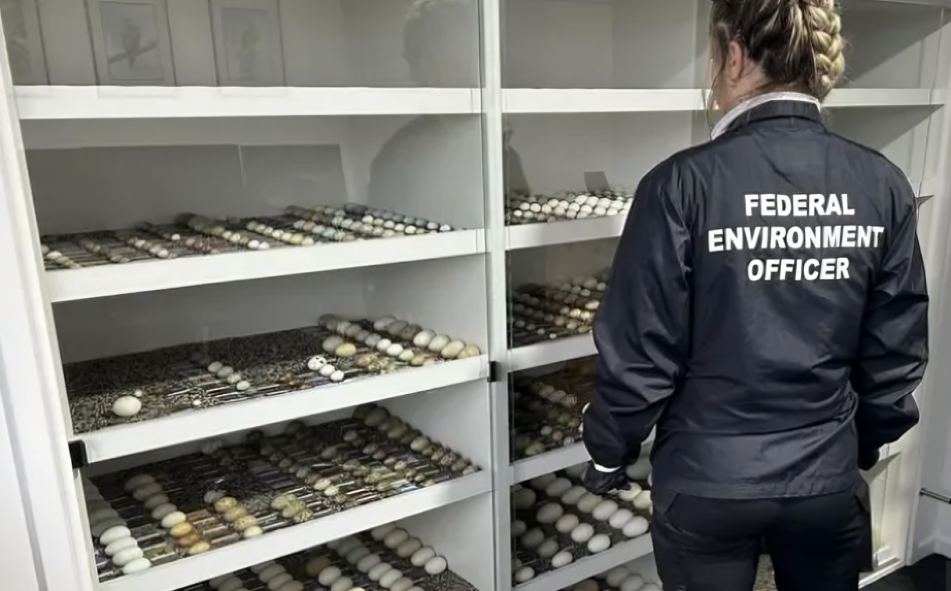- 13:25UN Chief Highlights Morocco's Sahara Initiative for Sahel Economic Integration
- 13:15Kamala Harris Targets Disenchanted Republicans in Key Battleground States Ahead of Election
- 13:00Morocco Bolsters Maritime Influence with IMO Council Vice-Presidency
- 12:45King Charles III's Australian Visit: A Royal Encounter Amidst Growing Republican Sentiments
- 12:25Moroccan Buyers Surge to Second Place in Spanish Property Market
- 12:05Kamala Harris Highlights Trump's Campaign Fatigue in New Attack Ad
- 11:40Stellantis Shifts Gears: Morocco's Automotive Boom Raises Questions for European Manufacturing
- 11:25Elon Musk Increases Financial Incentive for Petition Supporting Constitutional Rights
- 11:15Morocco's Human Rights Council Pushes for Enhanced Protections in Strike Legislation
Follow us on Facebook
Rare Avian Treasure Trove Uncovered: Australian Authorities Seize Thousands of Exotic Bird Eggs
In a stunning development that has sent shockwaves through the international wildlife conservation community, Australian authorities have confiscated an extensive collection of 3,404 rare bird eggs. The seizure, which took place on July 9th in Granton, Tasmania, is the culmination of a far-reaching European investigation into the illicit bird trade.
The collection, estimated to be worth between $400,000 and $500,000 (£207,000 - £259,000), represents a significant blow to the underground market for exotic wildlife. Each egg in the haul had been meticulously "blown" or hollowed out, rendering them purely ornamental in nature but no less valuable to collectors.
At the center of this investigation is a 62-year-old man who, while not yet arrested, is under intense scrutiny by officials. The suspect is alleged to have been deeply involved in the collection and harvesting of wild bird eggs, as well as the international trading of both Australian native and CITES-listed bird eggs.

The Convention on International Trade in Endangered Species of Wild Fauna and Flora (CITES) is a crucial international agreement designed to protect endangered plants and animals from the ravages of international trade. The presence of CITES-listed species in this collection underscores the gravity of the offense.
Environmental and wildlife crime has emerged as one of the most lucrative and rapidly expanding criminal enterprises globally. Its continued growth threatens to push numerous species to the brink of extinction, making operations like this one of paramount importance in the fight for conservation.
The seized collection is believed to include eggs from some of Australia's most vulnerable avian species. Among them are thought to be eggs from the forty-spotted pardalote, a bird found exclusively on Tasmania's Bruny Island, as well as the swift parrot and the shy albatross. These species face a high risk of extinction, making the theft of their eggs particularly egregious.
This Australian seizure is part of a larger, coordinated effort that began in 2023 when European authorities launched an investigation into the illegal harvesting, collecting, trading, buying, and selling of bird eggs within Europe and internationally. That operation resulted in the seizure of over 56,000 eggs across multiple search warrants.
Dr. Sally Bryant, a Tasmanian ecologist, shared her insights with ABC News, suggesting that egg collecting "was probably happening more than any of us realize." She emphasized the outdated and morally bankrupt nature of such activities, noting that collections of this magnitude are typically amassed by "skilled operators" over extended periods.
The legal ramifications for these crimes are severe. Interference with threatened and migratory birds can result in up to seven years imprisonment, a fine of $138,600, or both. The export of Australian native specimens, including eggs, and the export or import of CITES-listed specimens carry even harsher penalties: up to 10 years' imprisonment, a fine of $330,000, or both. Even mere possession of CITES-listed specimens can lead to five years imprisonment, a $330,000 fine, or both.
Tanya Plibersek, Minister for the Environment and Water, expressed her concern about the growing threat of illegal wildlife trafficking. "Illegal trafficking and wildlife crime is fast becoming a threat for many of our species that are already at risk of extinction," she stated. "We have to stamp out this terrible trade which sees our native animals captured in the Aussie bush and sent overseas to be sold."
This case serves as a stark reminder of the ongoing battle against wildlife crime and the importance of international cooperation in protecting vulnerable species. As authorities continue their analysis of the seized eggs to confirm the exact species involved, the conservation community watches closely, hoping that this significant bust will deal a lasting blow to the illegal wildlife trade and help preserve Australia's unique and precious avian heritage for generations to come.



